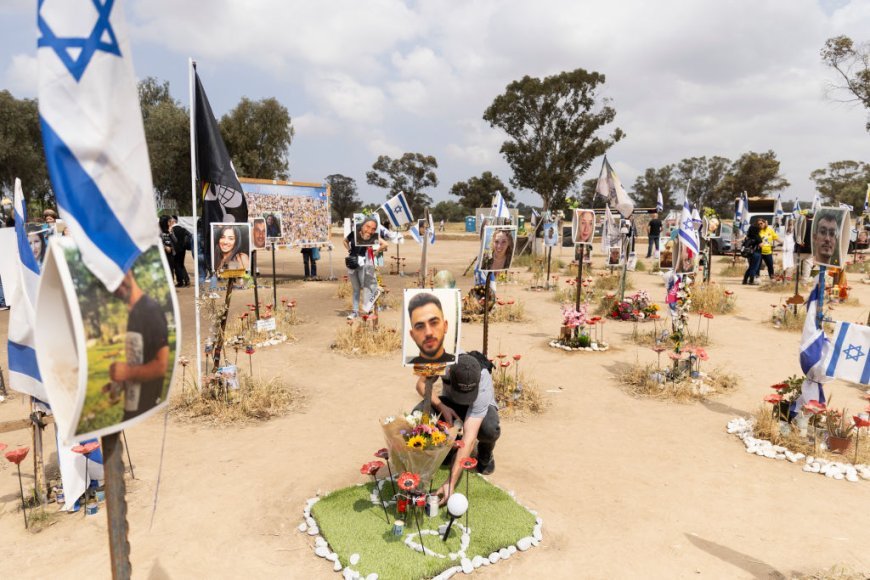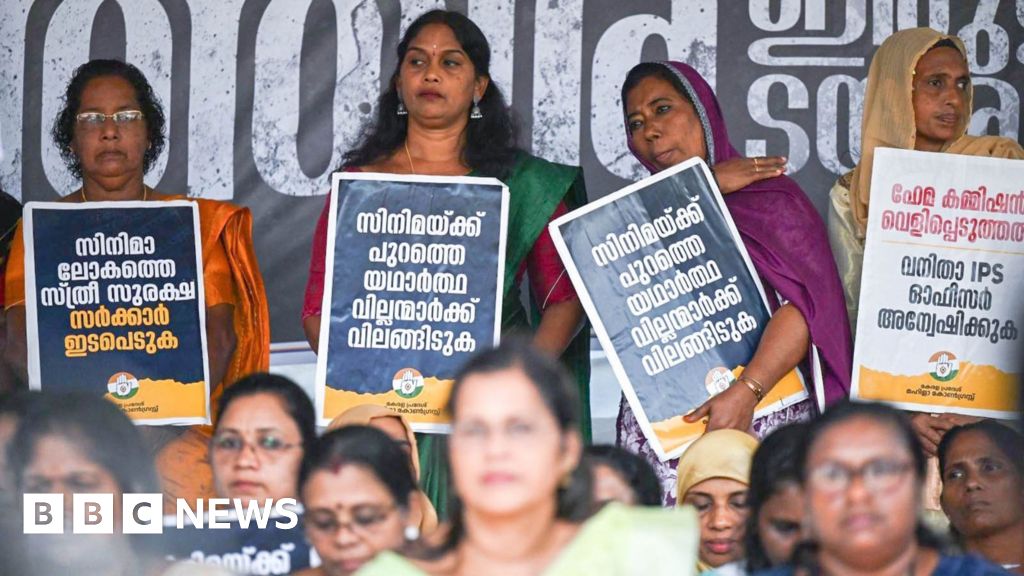How Jewish communities around the world will commemorate the Oct. 7 attacks
In just under six weeks, Israel and Jewish communities around the world will mark the one-year anniversary of the deadliest attack on Jews since the Holocaust and the start of an ongoing war in Gaza and fighting along the Lebanese border, as well as a major rise in global antisemitism. While these ceremonies will likely... Read More

While these ceremonies will likely focus primarily on the commemoration of the murder of some 1,200 people, the injury of thousands more and the kidnapping of more than 250 —nearly half of whom remain in captivity — they are also among the first official opportunities to establish the narrative of the Oct. 7 massacres, to place that watershed moment in the context of Jewish history writ large.
Were the attacks primarily the result of division within Israeli society and the Jewish world more broadly, coming amid an at-times vicious public debate over the Israeli government’s plans to overhaul the country’s judicial system? Were they the consequence of Israel’s long-standing policy of keeping Hamas in power in Gaza? Were they just the latest iteration in a long history of antisemitic brutality? Or were they something else entirely?
“Designing this memory has always been [the responsibility of] Jewish leadership. Some generations have succeeded and given us the best stories, which really make sense of who we are and what should be done. Some generations failed and these moments in history we dont even collectively remember,” Naama Klar, director of the Koret International School for Jewish Peoplehood at Tel Aviv’s ANU – Museum of the Jewish People, said at a discussion organized by ANU and the Weitzman National Museum of American Jewish History in Philadelphia last week.
Particularly in Israel, these questions are not abstract or theoretical. There is a roiling debate underway over the Israeli government’s plans to organize a memorial ceremony, as many of the communities attacked on Oct. 7, as well as the families of hostages and victims, hold the government responsible for failing to prevent the massacres and for failing to return the captives. As the government has refused to reconsider its plans, a group of residents from southern and northern Israel — known as the Kumu movement —has organized an alternative ceremony in Tel Aviv’s Yarkon Park, raising more than NIS 2.3 million ($628,000) through crowdfunding efforts.
In a bid to mediate between the two groups, Israeli President Isaac Herzog offered to host a state ceremony “without political trappings,” which was rebuffed by Transportation Minister Miri Regev, who is leading the government’s efforts. The families of hostages have also requested that the Israeli government refrain from using images of their loved ones in its ceremony, and large numbers of top Israeli artists have announced their refusal to participate in the government event.
This level of discord around Oct. 7 memorials is significantly less evident outside of Israel, where the focus is more on providing a venue for shared grief. In order to enable such memorial ceremonies, the Jewish Federations of North America is offering microgrants of up to $10,000 to communities that plan on hosting them.
“We think the most important and powerful way to mark Oct. 7 is in community and to give access to as many people as possible to mark the day,” Shira Hutt, executive president of JFNA, told eJewishPhilanthropy. “In the days and weeks following Oct. 7, there were nearly 200 community gatherings, vigils and rallies. People wanted to be together, they wanted to be in community, and so we feel that this is once again an opportunity to do that.”
The funding for the initiative, which has a budget of $900,000, was provided by Charles and Lynn Schusterman Family Philanthropies, the Jane and Daniel Och Family Foundation, the Jim Joseph Foundation, the Kirsh Foundation, Maimonides Fund, the Michael Susan Dell Foundation, The Paul E. Singer Foundation and the Russell Berrie Foundation. Representatives from these foundations are also part of the approval committee, Hutt said.
While JFNA offers a toolkit and recommendations for the events —encouraging collaboration with other local groups and focusing on support for Israel —Hutt said each organizer can decide the structure and content of the ceremony.
“We know that people commemorate in different ways and with different events. We want maximum flexibility,” she said.
The semi-virtual ANU-Weitzman gatheringfeatured a wide range of Jewish leaders and intellectuals to discuss these topics, to identify existing successful memorial practices, to craft a narrative around Oct. 7 and to consider how the attacks will be remembered in the future. In addition to Klar, the speakers included Dara Horn, the author of People Love Dead Jews; Rabbi J.J. Schacter, a professor of Jewish history and Jewish thought at Yeshiva University; Brian Schreiber, a former CEO of the Pittsburgh Jewish Community Center who led the its commemoration initiative for the 2018 Tree of Life shooting; David Bryfman, CEO of The Jewish Education Project; Vered Vinitsky-Sarossi, a sociology professor at Hebrew University who specializes in collective memory; Aya Feuchtvanger, a fellow at Beit Midrash Le’Ma’ase; and others.
The discussion, which was shared exclusively with eJP, did not offer a one-size-fits-all template for memorial ceremonies, but instead provided topics for consideration, based on Jewish tradition and history. ANU and Weitzman plan to release a document about the insights gleaned from the discussion next week.
The speakers, coming from different fields and backgrounds, offered both different topics to consider and different viewpoints about those topics. The Israeli speakers in particular noted the difficulty in thinking about memorializing the Oct. 7 attacks when they are — in many ways — still the reality in Israel, with hostages still in Gaza and many border communities still displaced.
“It’s very, very difficult for me to talk about memory when there are still people who are still living in tunnels [in Gaza] and are not here yet,” Vinitsky-Sarossi said at the start of her remarks.
Later in the discussion, Horn pushed back on this, noting that YIVO began hosting Holocaust commemorations in New York in the early 1940s while the genocide was still underway. She added that the Sonderkommandos — the prisoners tasked with disposing of the bodies of Jews murdered by the Nazis in death camps —started holding prayer services and saying kaddish “while they’re burning the bodies.”
“People need it now. It’s not that whatever we’re doing now is going to be the thing thats done l’dor va’dor [from generation to generation] but you are setting a stage and setting some precedence,” Horn said.
Vinitsky-Sarossi noted the significance of collective memory in the Jewish tradition. “There’s ‘Remember the Sabbath day, to keep it holy’ and ‘Remember what Amalek did to you,’” she said, referring to two biblical commandments. “The Zionist movement gave this practical expression… understanding that collective memory connects us.”
Bryfman also noted the power of Jewish collectivity, which he said was not being seen sufficiently, particularly around the issue of the hostages.
“Future generations will judge us, as a collective Jewish people, if we are not able to [come together on this issue],” he said. “Im not talking about the unity of the Jewish people necessarily but the singularity of the Jewish people fighting for this one particular cause of ensuring that all of our brothers and sisters can be freed from captivity. This has to be an issue which is not only pressing right now but in terms of future generations we need to be able to look back upon this time with pride that we as a Jewish people did absolutely everything that we could to bring our people home, and I dont think were doing enough. I think the issue is already becoming too politicized in Israel.”
Feuchtvanger noted that while the discussion primarily focused on the Oct. 7 attacks as a Jewish event, Jews were not the only victims.
“It is not only a religious event, that is to say that it [not only affected] the Jewish people. It’s also not just an Israeli event,” she said. Even among the Jewish victims, there were those who were secular and religious, those who “practiced Judaism in different ways,” she said. “Perhaps that is more common in North America, but here in the land of Israel, we are still struggling with that.”
“It is important to take all this baggage with us and to ensure — and I really mean to ensure, not only to aspire to ensure —that everyone who asks to remember will have a place to remember it, and that it will be done in a way that unites [people],” she said.
The attendees also dealt with more logistical questions: When should the attacks be commemorated? While even in Israel, the attacks are typically referred to by the Gregorian date on which they occurred — Oct. 7 —it is far more common to use the Hebrew calendar, but marking a day of profound mourning on the holiday of Simchat Torah, when the attacks occurred, is not a viable solution. Should commemorations instead be folded into existing days of mourning, such as Tisha B’Av?
“The Jewish yahrzeit is going to be Simchat Torah, which is a happy day, and even if we try to ignore it and say it is Oct.7,” Schreiber said. “It is going to be a big, big, big challenge, and it is going to challenge the sense of what mourning looks like in a holiday that is supposed to be so happy. That is real, so I think we need to call it out, because I think that is going to be part of the work. We face this in Pittsburgh every single year, whether we commemorate on Oct. 27, which is when most of the people commemorate, versus the 18th of Cheshvan, and we ultimately now do two different commemoration events.”
Schreiber added that —based on his experiences in Pittsburgh —having multiple times and ways to acknowledge the attacks is not necessarily a bad thing. “Not everybody commemorates in the same way,” he said. “Depending on how close people are to the situation itself, whether it is a direct impact as many people are, or if it is a secondary impact or a tertiary impact, that is going to impact [how they commemorate the attacks] a lot.”
Schacter offered the historical precedent of the debates in Israel about how to commemorate the Holocaust. Some initially advocated including Holocaust commemoration on Tisha B’Av, but this was eventually rejected primarily on practical grounds, he said.
“The interesting rationale that carried the day was that if you do it on Tisha BAv, its in the summertime and theres no school then, so when are the kids going to learn?” Schacter said. “Its such a prosaic, practical reason.”
He argued that creating a standalone memorial day for Oct. 7 ran the risk of losing commemorations of the attacks all together. Schacter noted that a fast day was designated in 1650 to mark the Khmelnytsky Uprising, one of the deadliest massacres of Jews in history.
“On the 20th of Sivan they established a fast day for tens of thousands of Jews [who were murdered] and its gone. Who today has ever even heard of the fast day of the 20th of Sivan?” Schacter said. “This was an amazingly powerful event in Jewish history —gone.”
Schacter said he can already see commemoration of the Holocaust beginning to fade. “My fear is that slowly it’s going to not have the same intense level as it has had until now. Survivors are dying, and fewer and fewer people – I analyze this from my own experience as a pulpit rabbi in the United States – are coming to Yom HaShoah events. And theres also a pushback against constructing a Jewish memory around the Holocaust, and that it’s enough with the Holocaust museums.”
Schacter — and others — offered the alternative of “bundling” Oct. 7 commemorations into either Tisha B’Av, which commemorates the destruction of the First and Second Temples and other tragedies in Jewish history, or Israel’s memorial day, Yom HaZikaron. The benefit of including Oct. 7 in existing memorial days is that it ensures that it will be commemorated in the future. Though Schacter and Horn noted that this comes with certain drawbacks as well.
“Maybe the only way to do it is to anchor it in a day that has powerful significance going forward, at least for a substantial segment of the Jewish people. And thats the 9th of Av, even though the theology is very problematic for me,” Schacter said.
The theology in question is the notion in Tisha B’Av that the Temples were destroyed because of the Jewish people’s iniquities —the first because of idolatry, sexual immorality and bloodshed, and the second because of baseless hatred. “There’s this framework of understanding catastrophe where there’s an assumption that these antisemitic massacres are the fault of the Jewish people,” Horn said.
On the one hand, this gives “people a sense of agency and power that they wouldnt otherwise have in this situation,” she said, but it also is a “problem” of blaming the victim for their own attack.
This year, different Jewish communities will commemorate the attacks on different days, Hutt said.
“Some [ceremonies] are taking place on Oct. 7. Some are taking place on Sunday just before because there’s more access over the weekend,” she said. “There may be some synagogues that mark the Hebrew date.”
Some 75 Jewish federations across North America have already organized memorial ceremonies, which are listed on a JFNA website about the initiative. “But over the coming weeks, we expect many dozens more events to be added to the website that will show again that the entirety of the Jewish community is coming together to mark the day,” Hutt said.
What's Your Reaction?




















